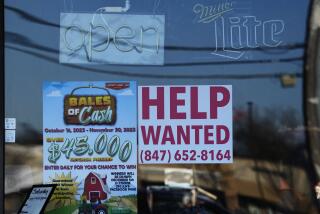Businesses Cutting Back on Spending : Indicators: Jobless claims rise in another sign that Fed rate hikes are cooling things off.
- Share via
WASHINGTON — Business investment in factories and equipment, a major source of economic strength for the last two years, will slow in 1995 to a much more moderate pace, according to a government survey.
Analysts said another report, on first-time claims for unemployment benefits, may point to a weakening job market.
They are the latest signs that the Federal Reserve Board’s interest rate increases are having the intended effect of cooling a potentially overheated economy that could fire up inflationary pressures.
The Commerce Department said Thursday that American businesses plan to boost capital spending by 6.6% this year to $592.9 billion, less than half the 13.7% jump recorded in 1994.
Over the past two years, investment in plants and equipment has been the fastest-rising category of spending.
But recent signs have indicated that the expansion is finally being braked by seven short-term interest rate increases over the past year, designed by the Fed to slow economic growth and head off any spurt in inflation.
The boosts are “finally having an effect,” said Michael Evans, head of Evans Group, a Boca Raton, Fla., economic consulting service. “We’ve seen weakness in the last month or two in nearly every sector of the economy.”
The capital spending projections are based on a survey of 21,000 companies from November through early February.
Economist Lynn Reaser of First Interstate Bancorp in Los Angeles noted that the survey was taken before the last Fed interest rate hike Feb. 1, and she cautioned that higher borrowing costs since then could cause even further cuts in investment spending.
In another report that could portend a slowing economy, the Labor Department said Thursday that first-time claims by newly laid-off Americans for unemployment benefits rose 2,000 last week to 349,000.
The total was the highest since 354,000 during the week ended Jan. 7, which analysts claimed was skewed by difficulties in adjustments for seasonal variations. Excluding that week, it was the highest since last July.
More to Read
Inside the business of entertainment
The Wide Shot brings you news, analysis and insights on everything from streaming wars to production — and what it all means for the future.
You may occasionally receive promotional content from the Los Angeles Times.










